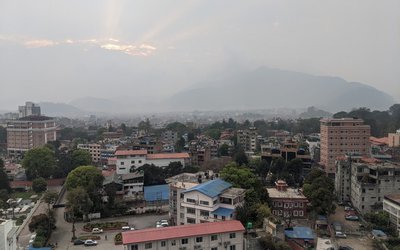After monitoring Nepal’s peace process for four and a half years, the United Nations Mission to Nepal (UNMIN) is leaving the country. UNMIN was initially brought here for six months to monitor the Constituent Assembly elections, and Nepal Army and Maoist combatants; and to logically end the peace process.
UNMIN failed to do any of these important works. Interestingly, when UNMIN is leaving the country, UCPN-Maoist, which does not believe in UN’s neutrality, is demanding its extension while a party like Nepali Congress, which has a great respect for the UN’s charter and its core values, is supporting its eviction. This shows the failure of UNMIN to maintain impartiality in the country during its four and a half year’s presence in Nepal.
The recent controversy over the political statement presented by UN Secretary General’s representative also reflects UNMIN’s controversial role during its working in Nepal. So far as the reactions given by president, prime minister and top leaders of other parties on the controversial political statement are concerned, I think it is not appropriate to react from such top positions. Nepal’s foreign ministry’s reactions to UN would have been sufficient.
I don’t believe that the sky will fall after the exit of UNMIN. Nobody can shake the present peace process as it is a compulsion for all political forces to abide by the present status quo. If someone believes that the present success is due to the presence of UNMIN, the belief will be proved wrong. In the last four and a half years, UNMIN made no contribution to end the political stalemate. If the political parties of Nepal cannot sustain Nepal, even the organization like UNMIN can do nothing. Had UNMIN’s presence brought any impact, Nepal’s peace process would have completed four years ago. It is unfortunate that UNMIN’s role in Nepal landed in much controversy. Political parties which were die-hard supporters of UN presence in the peace process are today condemning it. The recent political statement prepared by UNMIN seems based on hearsay and media reporting rather than analyzing in depth on the ground reality of the country. UN must evaluate its reports to see if there are some shortcomings. I don’t see any irrefutable evidences in UNMIN’s report.
As an international body, UNMIN should have maintained its neutrality. From very early days of arrival of UNMIN, I have often tried to caution UNMIN about its role. Even during the elections of the Constituent Assembly, UNMIN did not take notice of our complaints. I cannot say that UNMIN has intentionally taken the side of United Communist Party of Nepal-Maoist (UCPN-M), but its actions of the past showed UNMIN’s tilt towards Maoists. This is the reason Nepali Congress and CPN-UML opposed it. Out of 27 parties in the Constituent Assembly, almost 20 parties are opposing UNMIN. Nepal has long been an active member of UN and Nepal always believes in UN spirit. But due to biasness of UNMIN, it has lost credibility.
Many people are expressing worries about the situation after eviction of UNMIN from the country by January 15. Some people even are crying that there will be a major political disaster. But, I don’t think any major upheaval will be occurring after that. Nepalese political parties, including Maoists, have to follow the present state as they cannot go beyond this. The present status quo is the reality for Nepal and Nepalese politicians have to live with this reality. As the political differences are yet to be settled, I don’t see the possibility of formation of new government anytime soon. Although political parties, including the Maoists, have been saying that they will form the government, I don’t think it is possible right now. What I can say is that the time has come for Nepali Congress to reconsider its candidate. Only after withdrawal of the present candidate, we can start fresh negotiations with other parties. I don’t think CPN-UML will support our candidate Ram Chandra Poudel. In this situation, Nepali Congress has to take the crucial decision.
Otherwise, Nepalese politics will be like this for many years to come. Our candidate Ram Chandra Poudel has already lost 16 rounds of elections. It is unfortunate that our party has not even evaluated the gravity of this.
If leaders of three major political parties, Nepali Congress, CPN-UML and UCPN-Maoist, agree on certain agenda, nothing will be impossible. We can find political solution only by accepting strengths and weaknesses of one another. Nepali Congress leader Sushi Koirala, UCPN-Maoist’s Pushpa Kamal Dahal and CPN-UML leader Jhalnath Khanal can make a difference in case they agree on certain political goals. Prolonging the life of care taker government is not in the interest of the country. The time has come to have certain agreements among political parties to form the government.
After eviction of UNMIN, what we need to do is to develop political consensus. By doing this, we can give a good message to the world community. We have wasted the last six months without agreeing on political agenda. Maoists too must realize that they cannot go on the path of rebellion and the international scenario is not favorable. What we need is political consensus, nothing less.
(Joshi is a former Home Minister)
- TANAHU HYDROPOWER PROEJCT: A Significant Achievement
- Apr 15, 2024
- AMBASSADOR HANAN GODAR: Sharing Pain With A Nepali Family
- Mar 30, 2024
- VISIT OF KfW AND EIB TO NEPAL : Mission Matters
- Mar 25, 2024
- NEPAL BRITAIN SOCIETY: Pratima Pande's Leadership
- Mar 24, 2024
- NEPAL ARMY DAY: Time To Recall Glory
- Mar 15, 2024
















